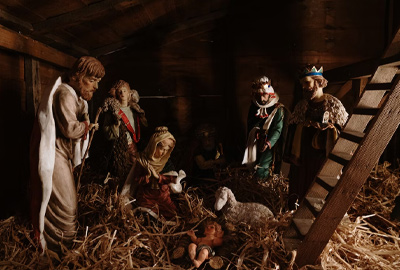“While they were there the time came for the baby to be born and she gave birth to her firstborn a son. She wrapped him in cloths and placed him in a manger because there was no room for them in the inn”. Luke 2: 6-7.
We read the beautiful story of Jesus’ birth every Christmas, gazing at the cute baby lying in the manger, Mary and Joseph kneeling in humble adoration surrounded by contented sheep, reverent shepherds, the cow and the donkey and perhaps an angel or two fluttering overhead. It is a serene, peaceful scene and as children we loved it. We still do!
At the same time, we are very conscious of how extraordinary and revolutionary this birth is. In recounting the story, the Evangelists are making the point that God, the ruler of the universe, the creator of all that is, was born, not in the luxury and relative safety and security of a royal palace, but in the dirt and damp of a draughty stable because there was no room for him anywhere else. God, the great I AM, comes to our world as a tiny, helpless human baby – vulnerable, dependent on the air we all breathe and on his mother’s milk. And there was no room! St Bonaventure says that in becoming one of us “God bent low – so low as to be humble and hidden in the visible faces of human beings”.
Here we see a God who comes especially close to those who are on the outside; a God who, at his birth is surrounded, not by the rich and powerful, but by simple, humble folk and by the creatures of the fields. Ilia Delio remarks that in this little baby “we are forced to discover the face of God in all the mess of the world – racial injustice, terrorism, poverty, global warming. Too often we want a God who will hear our cries and fix things…
But the mystery of Christmas tells us otherwise. It is not that God is deaf to the cry of the poor. It is rather that God is poor. It is not that God does not see our tears, but that God, too, is weeping”. (Ilia Delio: Mercy and the Humility of God).
And surely God is weeping for all those who are turned away because we say that there is no room – no room in our country, our neighbourhood, our street, our thoughts and lives. There is no room for the many young women who, like Mary, are often forced to give birth in refugee camps, in the forests or by the side of the road…. We read that among the surging number of migrants fleeing war and persecution are many young women who are forced to have their babies in truly dreadful circumstances — whether it’s in Libya as they wait to cross the sea on rescue ships; or in refugee camps in Greece and Bangladesh or at Budapest’s Keleti train station. Just recently, the Italian Navy reported that a 5-day-old baby and two women who were nine months pregnant were among 284 rescued from a fishing boat in distress in the Strait of Sicily.
Thomas Merton in his inspiring Advent meditation writes: “Into this world, this demented inn, in which there is absolutely no room for him at all, Christ has come uninvited. But because he cannot be at home in it, because he is out of place in it, – and yet must be in it – his place is with those others who do not belong, who are rejected because they are regarded as weak and with those who are discredited, who are tortured and exterminated. With those for whom there is no room, Christ is present in this world. He is mysteriously present in those for whom there seems to be nothing but the world at its worst.”
May we, as disciples of Jesus who made his home among the outcast, continue to reach out to those for whom there is no room in our world, to those who do not belong and who are denied their rights as persons. We know that in welcoming and making room for the excluded, refugees, the homeless, we are making room for Christ.

